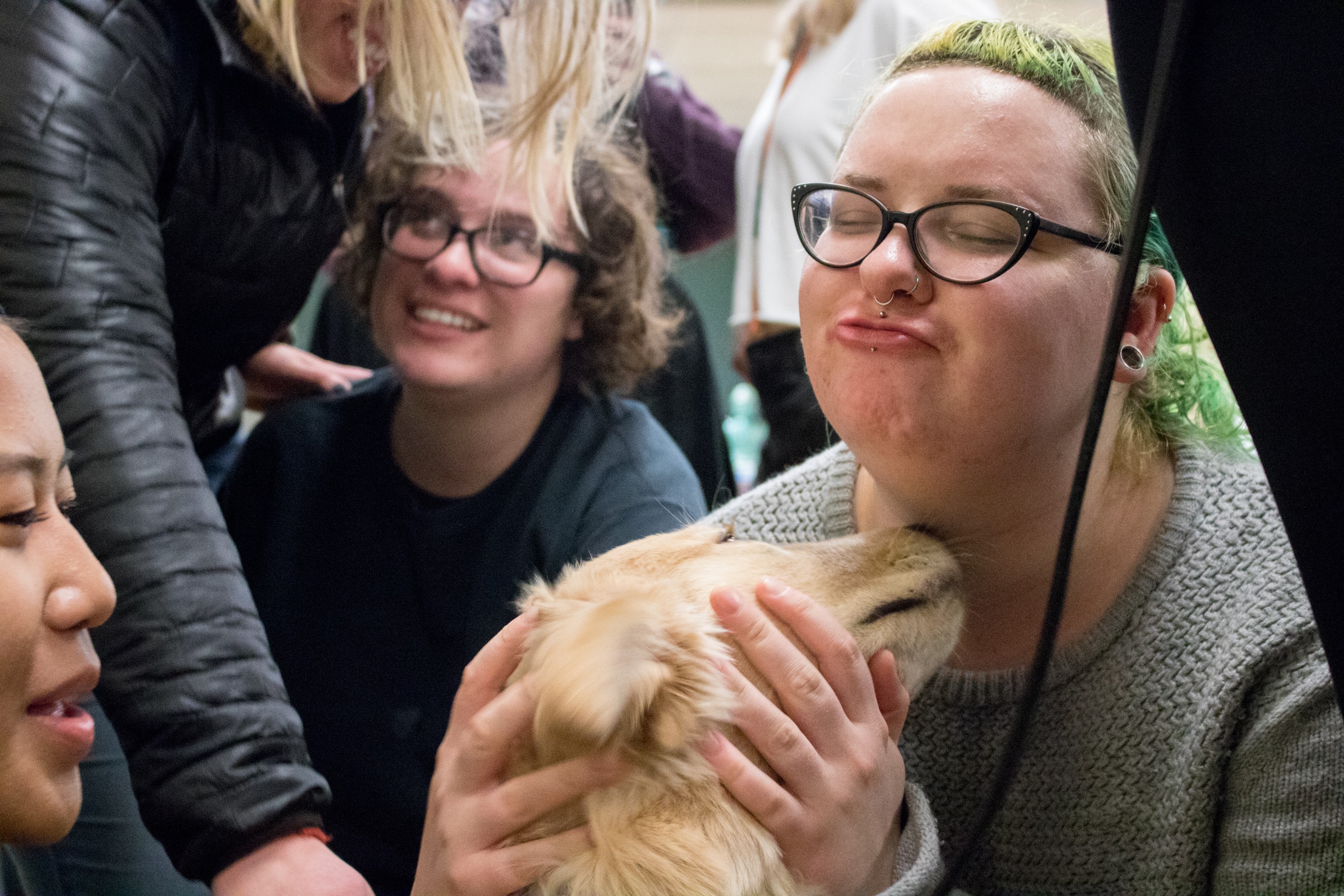Fifth-year Alex Quinn petting service dog in-training Willard.

In order to educate Lawrence students about service dogs, members of People for Animal Welfare (PAW) hosted an event called “Puppies and Pizza!” in the Diversity Center at 7 p.m. on Wednesday, Nov. 6. Students were encouraged to attend with free food from Sal’s Pizza as well as the opportunity to hang out with a few service dogs on campus after the presentation.
As an organization, PAW is committed to providing animal welfare education and involvement opportunities for students, including volunteering. Sophomore Anna White and senior Claire Zimmerman led the presentation about service dog etiquette, general information about the dogs and their time spent volunteering.
Service dog training at Lawrence began roughly seven years ago when a student who had been training dogs decided to continue throughout college. This now-alumna began training when she was in middle school. In recent years, Zimmerman has trained two dogs on campus named Parker and Aero. These dogs completed training and have now been placed with their owners.
Zimmerman is currently serving as a mentor for White who is training Willard, a six-month-old golden retriever. Both Zimmerman and White have volunteered with Custom Canines throughout their time training dogs. Custom Canines is a nonprofit organization in Madison, Wis. that strives to provide affordable service animals.

Photos by Sarah Navy.
Many dogs from Custom Canines were donated to the organization, allowing the organization to provide dogs at no cost to individuals. Student volunteers are often assisted with surprise veterinarian bills, but otherwise, costs are a part of the volunteer’s responsibility. Because of this, White invited students to donate dog toys to Willard for his birthday on May 5.
To be a certified service animal, a dog needs to complete general training, which typically lasts for a year or two, and specialized training. They also need to pass the Public Access Test and Canine Good Citizen Test before being certified and placed with their owners.
Many states say that service dogs in training still qualify as service dogs, allowing them special clearance in buildings and an exception to rules that prohibit pets. Allowing the dogs in training to be exposed to situations increases their chances of success, which is why these dogs are allowed in situations they would be expected to encounter when they are fully trained.
In addition to explaining the training involved to becoming a volunteer as well as general information about service dogs, White and Zimmerman also discussed etiquette for students. The two students explained that service dogs are really a piece of medical equipment when the dogs are wearing their vests.
While in the vests, dogs should not be pet or talked to, and eye-contact can even be considered a disruption. In order to do their job, the dogs need to be focused, and distractions only reinforce bad behavior. According to White, “It is so much harder to train Willard if people are constantly distracting him from the job that he needs to do.”
Zimmerman and White also dispelled myths about service dogs in their presentation. They addressed the idea that service dogs are overworked and are not allowed to have fun with slides full of pictures of Willard playing without his vest on.
According to White, Willard loves to “get dressed” each morning in his vest and explained that service dogs love to be intellectually stimulated; if they do not enjoy the stimulation, they will not be service dogs. Instead, they will be placed with families as regular pets.
A common myth about service dogs is that they all come from organizations. This myth was debunked with the presence of Imber, a collie in training with his owner, sophomore Morgan Donahue. Although Imber may not come from an organization like Custom Canines, he is still a valid service dog in training and allowed the same privileges as dogs from organizations..
After the presentation, Willard’s vest was removed, and he was promptly cuddled with many attendees. Students were encouraged to follow Willard and Imber on Instagram to follow their progress. Willard can be found under willard_the_sdit and Imber under service_snoot on the app.

